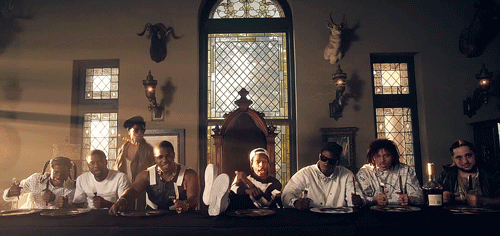Post by garygates on Jun 27, 2013 18:47:48 GMT
After finishing Grendel, the most fascinating part of the story for me, and still to this point the most curious, was Grendel's inability to really decide on a certain set of beliefs and philosophical ideas pertaining to his life. I found Grendel constantly altering his opinions on life and his guiding principles as he experienced different mind-altering events, most importantly being the Dragon's teachings and the Shaper's song.
Grendel faced extreme difficulty trying to choose whether to adhere to the Dragon's beliefs in a predetermined and harsh mechanical cycle of fate and the Shaper's beautiful words that told him that his life was meaningful, and that people have the power to change the course in history. At some times Grendel seemed inspired by the beauty of the Shaper's words, but eventually Grendel's mind would tell him that the Shaper was a liar and that history would not be rewritten, and neither could the future, which was predetermined. Grendel constantly contradicted himself, never explicitly aligning himself with either side of the fate or free will argument.
Such an example is Grendel's raid on the meadhall and the near death of Wealtheow. Grendel was changed by Wealtheow, he was "Tortured by the red of her hair and the set of her chin and the white of her shoulders-teased toward disbelief in the dragon's truths" (Gardner 108). He set out to kill her and change the tide of events. Grendel wanted to "kill her and teach them reality. Grendel the truth-teacher, phatasm-tester!. It was what I would be from this day forward...nothing alive or dead could change my mind" (Gardner 110). Then Grendel changed his mind. He decided to let go of Wealtheow and spare her life. He contradicted his heroic thoughts by going back to the Dragon's idea that killing her would not change anything. He would not be a hero or "truth-teacher" by killing Wealtheow because killing her, "It would be, for me, mere pointless pleasure, an illusion of order for this one frail, foolish flicker-flash in the long dull fall of eternity" (Gardner 110).
I guess my real question is that by the end of the novel, do you think Grendel adheres more strongly to the fatalistic idea that the Dragon represents, or the idea of heroism and free will that the Shaper's song represents? It is open-ended and you can choose to apply it to both your life and the novel.
And if you wish to dig a little deeper as it also pertains to the fight of ideas between the Dragon and the Shaper, do you think that heroism really exists, or is it meaningless in the fatalistic nature of the world?
Grendel faced extreme difficulty trying to choose whether to adhere to the Dragon's beliefs in a predetermined and harsh mechanical cycle of fate and the Shaper's beautiful words that told him that his life was meaningful, and that people have the power to change the course in history. At some times Grendel seemed inspired by the beauty of the Shaper's words, but eventually Grendel's mind would tell him that the Shaper was a liar and that history would not be rewritten, and neither could the future, which was predetermined. Grendel constantly contradicted himself, never explicitly aligning himself with either side of the fate or free will argument.
Such an example is Grendel's raid on the meadhall and the near death of Wealtheow. Grendel was changed by Wealtheow, he was "Tortured by the red of her hair and the set of her chin and the white of her shoulders-teased toward disbelief in the dragon's truths" (Gardner 108). He set out to kill her and change the tide of events. Grendel wanted to "kill her and teach them reality. Grendel the truth-teacher, phatasm-tester!. It was what I would be from this day forward...nothing alive or dead could change my mind" (Gardner 110). Then Grendel changed his mind. He decided to let go of Wealtheow and spare her life. He contradicted his heroic thoughts by going back to the Dragon's idea that killing her would not change anything. He would not be a hero or "truth-teacher" by killing Wealtheow because killing her, "It would be, for me, mere pointless pleasure, an illusion of order for this one frail, foolish flicker-flash in the long dull fall of eternity" (Gardner 110).
I guess my real question is that by the end of the novel, do you think Grendel adheres more strongly to the fatalistic idea that the Dragon represents, or the idea of heroism and free will that the Shaper's song represents? It is open-ended and you can choose to apply it to both your life and the novel.
And if you wish to dig a little deeper as it also pertains to the fight of ideas between the Dragon and the Shaper, do you think that heroism really exists, or is it meaningless in the fatalistic nature of the world?

